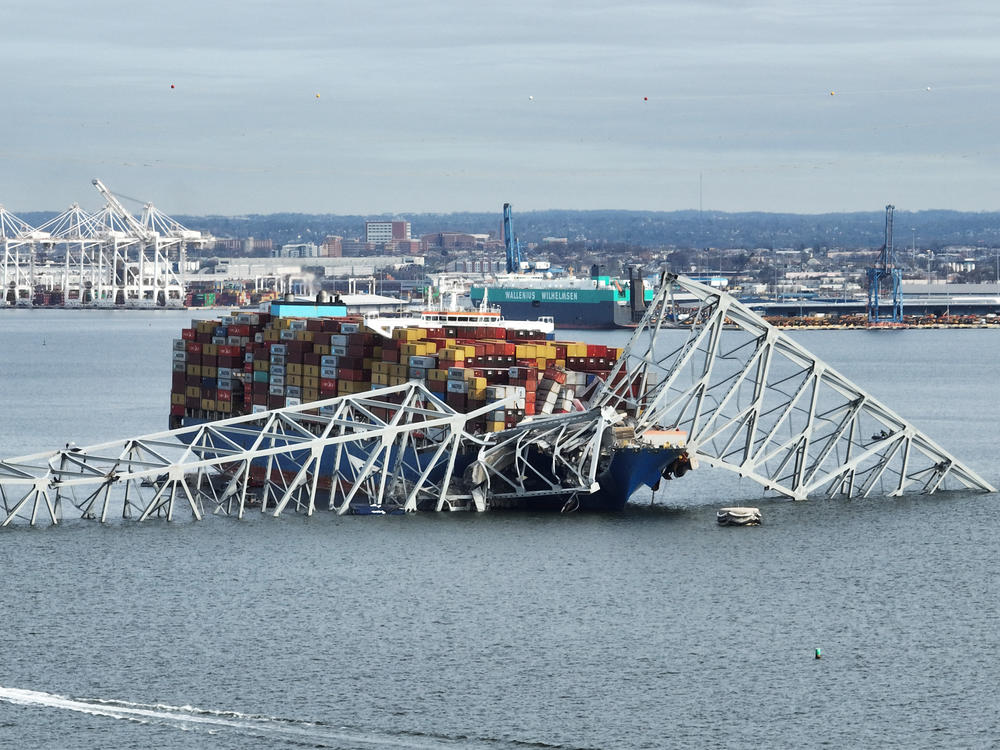Section Branding
Header Content
'No timeline' to recover 4 bodies after Baltimore bridge collapse, as cleanup begins
Primary Content
It looked like a crime scene at the site of the collapsed Francis Scott Key Bridge in Baltimore on Sunday, where police were keeping people and drones away.
Pieces of the bridge still blocked off the Patapsco River, and partially submerged girders still flanked the huge container ship that smashed into the bridge on Tuesday.
The bodies of two construction workers who were on the bridge at the time of the crash were recovered last week, and a search is ongoing for four others.
Gov. Moore said that while the search for the four other bodies remains a priority, he couldn't give a timeline for their recovery.
"We are focused on bringing that measure of comfort and closure to the families. There is no timeline because of how complex this operation is," he said.
Meanwhile, crews have begun a slow process of clearing the wreckage.
An "unprecedented" cleanup operation
The U.S. Army Corps of Engineers has to survey the damage before it will consider moving the ship, which is called Dali. Maryland authorities said that an initial survey found that the hull of the ship was damaged but still intact, which may make it easier to move when the debris clears.
Army Corp of Engineers Lt. Gen. Scott Spellmon told NPR on Saturday that it will take three steps to begin clearing the remnants of the bridge.
He said that the channel is 700 feet wide and 50 feet deep and there is much heavy steel bisecting it, with a lot of concrete at the bottom. The steel needs to be taken out and the concrete needs to be removed.
The National Transportation Safety Board has said that there are tons of hazardous material in some of the containers, some of which been knocked loose. The containers must be stabilized and the vessel must be refloated, Spellmon said, adding that the Coast Guard and the shipping company are in charge of this step.
Finally, 2,900 feet of the bridge's steel must be removed from the bottom of the river, he said.
It's "an immense task. And we are working 24/7 to accomplish this mission," Spellmon said.
Responders have begun cutting up the bridge to remove the wreckage. Gov. Moore said that heavy machinery is needed to get inside the channel to remove the bridge off the ship, which he said was about the size of the Eiffel Tower.
"This is a remarkably complex operation and really unprecedented," he said in an interview with NPR on Sunday.
Moore said this would happen by opening secondary pathways using what he said is the largest operational crane on the East Coast and can carry over 1,000 tons.
Moore said that while the operation was urgent, there was concern for the safety of the responders.
"When the divers are going down ... it's pitch dark, I mean you can only see between a foot to two in front of you, so it's really a feeling operation," he said.
Governor says bipartisan support is needed to fund the rebuild
President Biden has promised that the federal government would fund the rebuilding of the bridge, but Republicans are divided on whether it should.
"This is not just going to impact Maryland. Maryland doesn't need any favors," Moore said. "What we need right now is bipartisan support on getting our economy going again, because this is impacting the farmer in Kentucky, this is impacting the auto dealer in Ohio, this is impacting the restaurant in Tennessee, this is impacting all of us, so we have to move swiftly on it."
Insurance costs will drive up the total price tag
The Baltimore bridge crash is being called the largest-ever marine insured loss, Bruce Carnegie-Brown, chair of the global insurance marketplace Lloyd's of London told CNBC.
Experts say rebuilding the bridge alone could cost between $400 million and $1 billion, reported The Associated Press. But insurance costs will drive up the total price tag of the disaster.
The event could cost as much as $4 billion in insurance claims, according to Reuters correspondent Carolyn Cohn.
"One of the most important costs is going to be for business interruption, for all the ships that got stuck in port that can't get out, the ones that can't get in, all the goods that are being delayed traveling around the world," Cohn told NPR.
Cohn said that those cargo owners can claim their insurance for the delay to their business that will cost them money. She said there will also be compensation payments because of the lives lost and for any injuries.
She said while Lloyd's may be the most exposed, other insurance companies will also feel the pressure, including those in the U.S., in Bermuda, and reinsurers who insure insurers.

